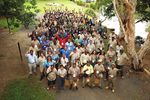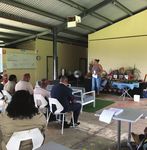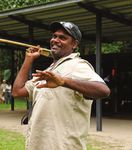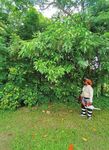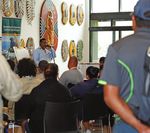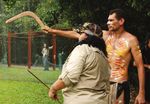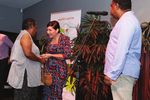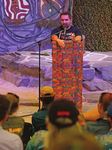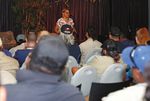Rangers Conference Indigenous Land & Sea
←
→
Page content transcription
If your browser does not render page correctly, please read the page content below
Indigenous Land & Sea
Queensland
Rangers Conference
10-12 March 2020
Proceedings
Bama Bulmba Mamingal
People love and care for country
Co-hosted by Djabugay Aboriginal Corporation/Bulmba Rangers and
Queensland Indigenous Land and Sea Ranger Program, Department of Environment and ScienceAcknowledgements Introduction To Country: Nyurramba garrang-ala, djunda-djundang bala:Nganydjiny “You’s mob come now, walk with us” Conference Snapshot • 117 Queensland Indigenous rangers • Land and Sea Rangers, QPWS rangers, Land Trust Rangers • From Torres Strait to Minjerribah (Stradbroke Island) • Around 150 participants in total Thank You to our Sponsors & Partners • National Environmental Science Program (NESP) Northern Australia Hub • Year of Indigenous Tourism, Department of Innovation and Tourism Development • Reef Joint Field Management Program (QPWS / GBRMPA) • Wet Tropics Management Authority (WTMA) • Tjapukai Cultural Park • Braschs Cairns Artwork by: Wally Brim Design & Layout by: Djabugay Design
Conference Day 1
Welcome To Country cultural knowledge-collectors, counsellors, a voice,
Facilitator Barry Hunter welcomed us to the and deadly.
conference and to Djabugay country, also
acknowledging the Yirrganydji people who share close Barry asked ‘what does healthy country, healthy people’
ties. Barry presented a video produced by Djabugay’s mean? The conference will challenge you to think about
Bulmba rangers and then invited us to acknowledge your own health, fitness and nutrition. We’ve got to start
country, call out to country, in our enacting and making it real. We need to have a healthy
individual ways before gathering in the main mind, learn something every day, yarn and read.
conference area to commence proceedings.
••••••••••••••••••••••••••••••••••••••••••••
More Than a Ranger!
(Barry Hunter)
In the opening session, Barry introduced the
conference theme — More than a Ranger! Barry
challenged us as rangers to think, over the course of
the conference, about how we can take our roles to the
next level in our work and personal lives. He invited us
to share stories about countries, work, what it means
for our mobs, noting that the role stays on, in and out of
uniform. Barry spoke of the evolution of the land and sea
management operators, with the land rights fight in the
Barry paid respect to the Queensland Indigenous Land 1970s, the archaeological rangers in the ‘80s (through
and Sea Ranger Program (QILSRP) in the Department the then Department of Aboriginal Affairs), the
of Environment and Science (DES) for the initiative in increasing clarification of Traditional Owner aspirations
co-hosting the design and delivery of the workshop. in the 2000’s, our mob growing more empowered,
recognised and invested in and now today we have
Barry provided an overview of the conference over 100 Land and Sea operators in 23 communities
program and the deadly range of facilitators and speak- across Queensland.
ers ahead. He introduced an ‘ice-breaker’ exercise,
where we shared a drawing and a story about our Barry spoke of rangers’ recent meeting with Minister
country with five others. Enoch, and when asked if she wants to be funding
rangers in 20 years’ time her response pointed to the
We then called out what being a ranger means to us: future business opportunities for Aboriginal land
managers. We are businesspeople, and this is where
• being on country, reconnecting with country, our future lies. Now we are being paid by the
old story lines and family government to deliver land management services, but
• pride, being proud of yourself we are building social enterprises. Julie-Ann Lam-
• working with community and Elders bourne will join the conference to talk about social
• showing leadership, having authority, being enterprise.
custodians
• being educators and role models for next We are having business impact now, for example:
generation
• listening to and learning from Elders • Yuku Baja Muliku with turtle hospital, art
• having a voice, networks and connections. gallery, junior rangers and research
• Dawul Wuru with fee-for-service crocodile
Barry suggested rangers are all of these things: management, Indigenous tourism,
instructors, links, researchers, cultural knowledge- fee-for-service work with Cairns Airport
keepers, heroes, cultural ambassadors, role models, managing mangroves
bridge builders, family, disruptors, facilitators, ground- • Gujuda with turtle research and market
breakers, influencers, interpreters, trend-setters, gardens, cultural tours and cafeConference Day 1
• Myuma with weed spraying for the national • For Chantel, from studying her Bachelor of Human
highway, commercialisation of spinifex, Services and doing cultural programs with child
protection of IP safety, she found that she didn’t enjoy the work
• Ewamian with tourism and fee-for-service or the red tape involved. She started working for
work. the PBC and then helped write the submission for
Land and Sea rangers. She didn’t have a strong
Rangers broke into small groups to discuss, ‘How can connection with culture as a child, so returning
we make ourselves better, to inspire and take our mob to country and doing this work is deepening her
to the next level?’ Our responses were: learning about culture.
• more rangers
• give respect to get respect
• Government to listen to our mob
• knowledge passed to reliable people
• learn from Elders
• more youth role models
• take what we learn back to country
• Indigenous fire management
• build capacity/leadership in our group
• everyone put in their best every day
• self-development, improve our knowledge and
fitness
• keep our equipment in order •
• self-sustainable and independent • For Dawn, she holds close to her heart the
• fulfil our contracts, demonstrate that we can struggles of her Elders to bring their community to
do it where they are today, and this gives her strength
• build a brand; rangers are a walking, talking in her work as a ranger.
brand. • For Laura, being a Ranger Coordinator is an
important role for protecting and practising culture.
•••••••••••••••••••••••••••••••••••••••••••• Her grandmother is an inspirational person and
she is motivated to deliver benefits for the next
Stories from women working on generation.
country (panel)
Larissa Hale, Managing Coordinator of Yuku Baja
Muliku introduced the panel — Sarah Barkley (Ranger
Coordinator, Mapoon), Brittney Butler (Yirrganydji
woman, QPWS), Chantel Van Wamelen (Ranger
Coordinator, Butchulla), Dawn Harrigan (Jabalbina
Ranger Coordinator/Ranger Resource), Laura Pearson
(Senior Ranger Supervisor, Central Ranger Cluster,
Torres Strait Ranger Program).
Larissa asked the panel, ‘Why did you become
a ranger?’
• Sarah responded that her grandmother was her ‘Which woman inspired you the most?’
mentor and inspired her to go back on country.
• For Brittney, it was a love of working on country, for • For Sarah, it is her grandmother who helped
country. Being a ranger is a role that makes her through struggles.
proud. • For Brittney, her grandmother who taught her to be
responsible and took her fishing.Conference Day 1
• For Chantel, it is the strong women in her Larissa, who is in on many committees, encourages
community — there are many of them. women to ‘take on these roles, put your hand up, put
• For Dawn, it is the old people and all of their women yourself forward and speak for country’.
(rangers) who have come far with their training —
coxswains, fire management, looking after women’s Contributions from the audience included:
sites. • Women empower each other and provide
• For Laura, it is her grandmother, aunties and sisters inspiration, thanks to Larissa and the panel for
— they all played a big part. Sister Larissa is an paving the way for all of us.
inspiration. • Women and men are equal. In the past, ranger
teams were a male-dominant role, but because of
women doing a great job they now stand as one in
taking care of country.
• Passionate about working with the younger girls.
Lots of kids don’t feel connected to country and it’s
important that we focus on passing it on to the kids.
••••••••••••••••••••••••••••••••••••••••••••
‘Great Barrier Reef Foundation:
Traditional Owners and the Reef
Trust Partnership’ presentation
(Dr Leah Talbot, Traditional Owner Partnership Team -
GBRF)
‘What do you like best about your job?’
Barry introduced and welcomed Dr Leah Talbot, the
• For Sarah, it is seeing the Elders on country. Their Projects Manager in the Traditional Owner Partnerships
faces light up and that tells you that you’ve done Team with the Great Barrier Reef Foundation (GBRF).
something good that day.
• For Brittany, being young brings more challenges Leah acknowledged her Kuku Yalanji brothers and
but also helps her in inspiring the young generation. sisters present at the conference. She also
• For Chantel, it is her passion for inter-generational acknowledged the Traditional Owners the Djabugay
learning. and Yirrganydji Peoples. She thanked all of the
• For Dawn, it is her support for successful Junior rangers for the amazing jobs they do in looking after
Rangers. our country.
• For Laura, it is the seasons and the still-pristine
environment in the Torres Strait. The central cluster Leah is now working with the Great Barrier Reef
is on the front line of coastal erosion. It is her only Foundation to look at how Traditional Owners can be
home and the work they are doing — revegetation, better involved at all levels across the reef and
planting traditional trees, and involving schools contribute to making changes and managing the Reef.
— is important. She can see the outcomes from Leah mentioned the other members of the Traditional
everyone chipping in. Owner Partnerships Team who include Liz Wren as the
• Larissa suggested that is important to not forget Director, Karin Gerhardt as the Program Manager, Eliza
your five-year-old self — to be fearless, dance in Glasson as the Senior Secretariat and Brian Singleton
the light, ask hard questions, put yourself forward. as the Engagement Manager – who many of you here
would know well.
‘What is the one piece of advice you would give to
women who want to be rangers?’ Leah also acknowledged Larissa Hale as the Chair and
Gavin Singleton as members of the GBRF’s Traditional
• For Sarah, ‘it’s never too late, keep striving’. Owner Working Group, other members also include
• For Brittney, ‘stay confident, believe in yourself, that Malcom Mann, Traceylee Forrester and Stan Lui – they
you can do anything’. are leading, to drive the change needed for Traditional
• For Chantel, ‘hold the fire in your belly, be proud of Owners of the Great Barrier Reef.
who you are’.Conference Day 1
The Reef Trust Partnership has focused funding to Over the first six months of 2020 the team will focus
Traditional Owner components over the next 5 years – on establishing Traditional Owner Technical Working
including opportunities for $20M towards water quality, Groups across four Reef Trust Partnership
$5.8M for crown-of-thorns starfish management, $10M components and are calling for Expressions of Interest
for reef restoration, $4M for integrated monitoring, now to be involved in these. They will continue to work
$10M for a Traditional Owner Futures Fund and $2M with Traditional Owners on co-design values and
for Traditional Owner Phase 1 Grant Program. principles, and what this means in practice for water
quality, crown-of-thorns starfish, reef restoration and
integrated monitoring. They will continue to engage
with Traditional Owners through local and regional
meetings, working up to a reef wide forum in 2021.
GBRF will be holding a strategic roundtable with
Traditional Owner thought-leaders to look at workforce
and training requirements to deliver across the Reef
Trust Partnership and will continue to listen and learn
with Traditional Owners and others about establishing a
Futures Fund.
Leah encouraged rangers to participate at all levels for
Traditional Owners — to consider the working groups
and to come along to the Traditional Owner co-design
GBRF is taking a co-design approach to how the workshops held in the various locations along the coast
funding should be allocated — in a process of planning, and to start to think about how you as Traditional
negotiating knowledge and research needs, Owners we want these funds to be directed.
appropriate governance arrangements and access to
benefit sharing. ••••••••••••••••••••••••••••••••••••••••••••
‘Research, rangers and rethinking
The economic value of the reef has been estimated
by Deloitte Access Economics at $6.4 Billion per year
the roles’ presentation
(Professor Michael Douglas, NESP)
— and it does not include the value of the Reef as a
cultural landscape and more of this should go to
Traditional Owners to care for reef country.
What has been done so far – a commitment of 10%
of Reef Trust fundingdedicated to Traditional Owners.
Establishment of a Traditional Owner Working Group,
immediate investment of $1.8 million grants program to
respond to Traditional Owner priorities, a commitment
to hold a workshop to inform the co-design of the RTP
annual workplan. The team is holding strategic
meetings, workshops and stakeholder forums to
provide input and advice on matters affecting, or of high
importance to, Great Barrier Reef Traditional Owners.
Barry introduced Michael Douglas as Hub Leader of the
Traditional Owners have told us a key priority is to
Northern Australian Environmental Resources Hub: a
establish the Traditional Owner governance
six-year research initiative focussed on supporting the
arrangements for the program — including the
sustainable development in northern Australia, funded
Traditional Owner technical working groups for water
by the Australian Government’s National Environmental
quality, crown-of-thorns starfish, reef restoration
Science Program (NESP).
and integrated monitoring.
Michael acknowledged the Djabugay and Yirrganydji
Traditional Owners.Conference Day 1
The goal of the Northern Hub of the NESP is to support Exploring rangers’ greater purpose
sustainable development in Northern Australia. They (Barry Hunter)
have $24M over six years to undertake research in four
areas: Barry explained that the afternoon’s sessions would
focus on the varied roles and greater purpose of
• reducing risks from conventional development rangers. Barry introduced the ‘super-star’ panel, who
(intensive agriculture and mining) would be facilitating small group discussions.
• supporting alternative economic development These included:
• planning for future development
• managing threats to biodiversity and research • Dr Leah Talbot
to support doing this in the most effective way. • Patrick O’Leary (Pew Foundation)
• Julie-Ann Lambourne (Tagai Consultants).
Rangers are providing a huge service to Australian
societies and dealing with real-world problems on Barry encouraged rangers to think about our roles in
country. A lot more rangers are getting involved in ‘leading’ – leading research relationships, in leading
research — they spend time on country, have skills in management of country, in leading work to attract
monitoring and presenting findings, and are multiple sources of investment.
undertaking fee-for-service work.
••••••••••••••••••••••••••••••••••••••••••••
However, there are opportunities for doing research in a
different way, supporting a different role for rangers.
The approach to the research process in the past has
What are rangers’ roles in community?
(Barry Hunter, Djabugay; Paddy O’Leary, PEW)
not involved rangers properly — with the development
of the research question, the presentation of the results
This session provided us with an opportunity to think
(mostly to other researchers only), the publication of
about how our roles and the work we do might evolve
the results and the impact not involving rangers. As a
in the future. In each session, we broke into two smaller
funding body for research, the most common complaint
groups and discussed ideas about:
that they have heard from ranger groups is that
researchers didn’t report back to them on the findings.
They are now saying to researchers seeking funding
from them, ‘You need to focus your research on a
solution to real-world problems’. Researchers should
be engaging Indigenous rangers from the beginning
and throughout the research process — in resolving
the research question (rangers know the real-world
problem), identifying which problems need research,
in making sure that the research impact benefits the
work that rangers do, and analysing the economic
and social benefits for communities.
We need ‘trans-disciplinary’ research — that
1. What does it mean to be an Indigenous Ranger
recognises different expertise. This requires a
currently?
different sort of scientist — one who is committed to
2. What might our roles involve in the future, with
working with others and being a good listener. The
changing technology and environmental challenges,
approach takes time, money and patience but can
and greater recognition by the wider community of the
deliver a greater range of benefits for science,
importance of traditional land managers working on
rangers, country and society.
country to restore natural ecosystems, protect culture
and protect the environment?
We discussed issues further in the small group
sessions.
We brainstormed these questions in smaller groups —
our ideas are summarised below:
••••••••••••••••••••••••••••••••••••••••••••Conference Day 1
What are rangers’ roles currently? Community liaison
• improving neighbour relationships
Protecting and managing cultural sites • cooperative work
• archaeological digs • community engagement
• cultural site management • junior rangers learning on country
• protecting cultural sites • language revitalisation
• compliance (working with QPWS / traditional
methods)
• advocates
Environment
• water quality
• erosion control
• sediment trapping
Tourism and visitors
• working on building up tourism
• compliance patrols
Research
Natural resource management • learning about science and data
• weed management • surveys research
• feral pest management (aerial shooting, • data management
trapping and shooting)
• turtle monitoring (sand movement and nest Maintenance
protection) • infrastructure and building
• coral and seagrass monitoring • machinery maintenance
• wetland survey
• reef surveys (coral bleaching, % live coral) Training and tech
• wild croc harvesting (egg collection) • working on certification
• animal handling protocols (microchip, samples • technology (drones, ipad, itracker, camera
e.g. blood, measurement) traps, GPS )
• shorebird surveys • technology (u/w drones, air drones), more
• bio security (beach patrols, bugs, YCA, rats efficiency, sometimes increases work
eradication, Singapore ants) • GIS and remote sensing (changing land use)
• monitoring endangered species
• practising traditional methods What has changed/is changing?
• croc monitoring (skills e.g. coxswains)
• vegetation health check Technology
• animal handling (measurements, survey, • use drones for mapping, check changes in
trapping, cameras) country, animal surveys
• dealing with biohazards
Recognition of Traditional Owners
Fire • new ranger bases under construction
• fire education • re-occupation, rebuild community
• patrolling boundaries, fire breaks • Traditional Owners can control access, make
• fire management (aerial ignition, navigation key decisions
training) • continue strong presence, tourists, locals,
• cultural indicators on country researchers get permission
• traditional fire management and knowledge and • community leadership and empowerment
recognition from QPWSConference Day 1
Employment • noticing delay in plants flowering, bees and
• more ranger roles, paid roles on country insects under pressure
• Traditional Owners need to be part of • opportunity for species monitoring and baseline
management equation, funding is part of that surveys (know what’s there)
• Country is going downhill, but management is
improving country Fire management
• rangers are more prominent • complex to negotiate burns near Cairns (fire
• needed a degree in the past, not many jobs management is getting more challenging)
• training skills (coxswains, heavy machinery, • good fire techniques have revived country
compliance) • new recognition of Indigenous fire is an
• acceptance opportunity
• more mob in leadership positions
• fee for service work New opportunities
• contract opportunities • bio-prospecting – traditional medicine
• ranger chopper pilot positions • biosecurity and fisheries
• roles in QPWS • collaborations with scientists and industry
• fee for service (biosecurity, marine parks, fire
Increased access and tourism management on state lands)
• road improvements (positive for Traditional • more engagement with researchers (leading
Owners) BUT will bring tourism access and research, monitoring the reef, green zones)
pressure • managing water (cultural rights)
• tourism and access brings pros and
conservation ••••••••••••••••••••••••••••••••••••••••••••
• more rangers will be needed to manage more What are rangers’ roles in caring for
people
• pressure on fishing spots (local food source)
country (Indigenous-led research?
(Dr Leah Talbot)
• paying for access and caps for numbers
• Traditional Owner control of tourism on land is
Leah explained that she was trained in technical
an opportunity
science and learned all the mainstream scientific
• pressure on privacy
techniques, which did not include much Indigenous
• change to water quality and consumption
knowledge. Now she focusses on Indigenous research
• airstrip and access
methodologies.
• tourism opportunities (how to develop ideas?)
• compliance (land and water)
• visitor management
Natural resource management
• weed spread is future issue
• protecting rivers used by community for drinking
• weeds and erosion have got worse
(e.g. bellyache trees, rubbervine)
• sea erosion in Torres Strait
• turtles laying later due to heat, eggs/hatching
less successful
• bird migration changing, tourism disturbing
beach birds
• coral bleaching
Environmental science is about methodological
• poor fire management affecting wildlife
frameworks, data collection techniques and analysis.
• Crown of thorns starfish on reef and in Torres
As a contrast, Indigenous-led research involves Elders
Strait
committees/Advisors, co-researchers, co-authors,
• catchment impact on reef
collaborative outcomes, ‘walking together’.
• weed spread and growth of Cairns
• turtle nesting around Cairns is decliningConference Day 1
What we know is that research happens on country; but • Protectors/up holders of lore — knowledge
it needs to happen with Indigenous people. We are not -holders, be respectful of the lore on country,
having a debate about whether connection to country is guardianship of knowledge (protect knowledge
broken, or whether Indigenous science exists — it does system).
so because we are here!
What does Indigenous-led research look like?
What does it mean for our mob to lead this research?
Empowering’ Indigenous people in the research space? • research protocols
What does it mean — our way of knowing? We need to • meetings to talk about respect and
build our own deeper understandings, set the agenda, accountability
move into the driver’s seat. • get training from researchers to do own
research
We need to link research to country. We must consider • identify researchers to work with
rights and roles to country, rights and roles to • being part of the research team
knowledge. We have another tool for the tool box – • consulting Elders for priorities and threats
Indigenous research methodologies. • let researchers know our priorities
• creating new knowledge, e.g. calendars.
Leah spoke broadly about rangers’ roles in
Indigenous-led innovation and research — as leaders, ••••••••••••••••••••••••••••••••••••••••••••
co-researchers, translators, problem-solvers,
collaborators and protectors of lore. She asked rangers What are rangers’ roles in business
to reflect on ‘what does Indigenous-led research look and social enterprise?
like to you?’ (Julie-Ann Lambourne)
Rangers’ discussion centred around these questions: Julie-Ann began by reminding rangers that Indigenous
people are the oldest living culture — we need to be
1. What are rangers’ roles in Indigenous-led proud of this and participate in business as leaders in
innovation and research? the fields we work in.
2. What does Indigenous-led research look like?
(Does research match our priorities? Do we
share in benefits and outcomes? Does research
answer questions we want answered?)
Our responses are summarised below:
What are rangers’ roles in Indigenous-led innovation
and research?
• Leaders — authority to speak up, role models,
project managers
• Co-researchers — conservationists and looking
after ourselves, good intentions, treading lightly
• Translators — translators of data to audience It is important to find other sources of funding other
(community), teachers and learners, liaison than government. Funding can be cut from government
role, open communication — having an enterprise to fall back onto can ensure
• Problem solvers — respectful of country, that the organisation continues beyond government
country is the boss, open to new ideas, monitor, funding cycles.
learn, observe, overcome
• Collaborators — making sure we stand up and There are two types of business — commercial
keep awareness of protocols, cultural protocols/ enterprise and social enterprise:
Elders involvement, cultural advisors/ cultural
inductionsConference Day 1
• Commercial enterprise engages in commercial, • Chuulangun rangers discussed the Chuulangun
industrial or professional activities with the camp grounds
explicit purpose of making a profit. (https://www.kaanjungaachi.com.au/ChuulangunCamp
• Social enterprises are businesses for a purpose grounds.htm).
that use business strategies to achieve a social, ••••••••••••••••••••••••••••••••••••••••••••
cultural or environmental goal.
How do you delegate work to
What are the commercial opportunities for our ranger rangers, manage priorities, and deal
group/organisation?
with conflict?
• look at our skills/assets that can provide a (Clinton Scott-Knight)
commercial service
• build each other up Clinton Scott-Knight is a qualified trainer and assessor
• use our cultural knowledge to start business with National Indigenous Training Employment
ideas Solutions. This closed session for ranger coordinators
• protect our cultural Intellectual Property and managers focussed on leadership, a key part of
• we have to go after it, don’t wait until the perfect those roles.
business case is written, or the ideal
infrastructure is in place.
What are the steps we need to take from ‘inspiration to
implementation’ of a business idea?
• know exactly what our business idea/product is
• Why is our idea/product different from others?
• Who are our customers?
• How will we make money?
• get good advice, and be ok to ask
• start small and build it as we go.
Ranger discussion covered different groups’
experiences in running a business: Clinton began by asking: ‘What is leadership’?
• Butchulla rangers pointed out that you need Leadership is the art of motivating a group of people to
money to start a business, e.g. to buy a bus to act towards achieving a common goal. Leadership
start tours. Others suggested that you need to involves dealing with conflict, managing stress, and
start small and partner with other businesses managing priorities and delegating.
to help.
• Michael Ross (Olkola) talked about their He talked about how we can get the best out of the
three tours/year, taking people out to see people we are leading. Recognising diversity — points
work on-country of difference — in personal identities. We only start to
(https://www.olkola.com.au/copy-of-corporation).
notice similarities and differences of individual when we
• Yirrganydji rangers spoke about their fee-for come into a relationship. Everyone has their own world
service work (http://dawulwuru.com.au/ views, and their own perceptions. Whenever we
land-management/). communicate, we are defining ourselves in relation to
• Mandinglbay Yidinji (Djunbunji) talked about the other person.
their tourism development
(http://www.djunbunji.com.au/tours/).
Clinton spoke about conflict management styles
• Ewamian rangers discussed their hot springs (Accommodating, Collaborating, Avoiding, Competing
tourism project and Compromising). He discussed causes of
(https://www.ewamian.com.au/talaroostation)
workplace stress such as deadlines, criticism and too
• Bunya rangers spoke about their fee-for-service much work, and what we can do about it — remove,
weed-steaming work for clients who want change, accept.
chemical-free weed control.Conference Day 1
Clinton then talked about the four steps to delegating: Australian Government just announcing that they have
committed to funding ranger groups until 2028 —
1. Identify tasks proving seven years of funding certainty.
2. Set expectations
3. Develop a team action plan Congratulations to everyone involved, and time now to
4. Communicate and delegate. work on the Queensland Government for a long-term
Leaders need to create a ‘feedback culture’ where we funding commitment.
allocate time to check in with our staff, model openness
and honesty, and acknowledge our own mistakes. We
can use techniques such as the ‘balcony view’ and
‘above the line thinking’ to be effective leaders.
••••••••••••••••••••••••••••••••••••••••••••
More than a Ranger! wrap-up
(Barry, Paddy, Leah, Clinton)
Barry Hunter said the feedback from the workshops
really highlighted the theme ‘More than a ranger!’
Rangers have many roles and are a foundation of
cultural knowledge. Clinton Scott-Knight thanked the organisers for the
opportunity to facilitate the Ranger Coordinator session
on leadership. This session included discussion about
the role of leadership in motivating people; and about
the different styles of leadership. Rangers talked about
the risk of burn out, stress associated with dealing with
conflicts, and the need to manage how they can affect
our behaviours and physical well-being.
Paddy O’Leary said the workshops highlighted how
much growth and change there has been in the last
20 years. Your grandparents and parents maintained
the vision of getting people back on country; you are
realising that now.
Every ranger group started off small and piecemeal, but Barry thanked Julie-Ann, Leah, Clinton and Paddy for
with vision you have built and built. In the last 5–6 years contributing her business development skills through
there has been more appreciation of the work rangers the workshops. Leah Talbot thanked participants.
are doing, and greater awareness in wider community
and in cities. Work on country provides stability. ••••••••••••••••••••••••••••••••••••••••••••
We are going to need more rangers, as there are more
environmental challenges on our plate. Some groups
get State funding, some national, some both. There has
been recent success from your lobbying efforts, with theConference Day 1 Taking time out for some fun! The conference wasn’t all hard work! Spear-throwing led by Tjapukai staff kept us active on both days of the conference. Our competitive spirit was alive and well, with the ‘finals’ on the second day dominated by the Pormpurraw rangers. We also took part (mostly willingly!) in a surprise ‘zumba’ warm up on the morning of day #2. ‘Zumba’ means ‘to move fast and have fun’. Well, we did — rangers rocked those Zumba moves and worked up a sweat, a great way to start day #2!
Conference Day 2
Getting comfortable with to pass on knowledge about caring for country.
uncomfortable — the importance Our grandparents didn’t have the same challenges we have
of health and wellbeing for fitness. The statistics on Indigenous versus non-Indige-
(Gary Lui) nous health are not good — for example, in remote areas I
ndigenous men live 13.8 years less than non-Indigenous
Barry introduced Gary Lui from Umi Fitness. men. Our purpose might be for our job — to keep doing it,
to benefit others at home and work.
Gary paid kudos to rangers and our motivation — getting up
early and getting into our jobs. He invited us to think about He encouraged us to act now — our future is shaped by
getting out of our comfort zone and bringing that same level what we do now. Growth comes from stress — get out
of motivation to our health and fitness. In order to make a of our comfort zone regularly (get comfortable with the
healthy change, we need a purpose, a reason, a motivation. uncomfortable!). Build good habits first, then behaviours
There are push and pull factors toward health and fitness. (e.g. reduce alcohol), build routine and structure in our life
Pull factors, that comfortable sofa, Netflix, sugary food, can for fitness. It then becomes our lifestyle. This all leads to
be a big problem. change. Gary invited us to use his website for a 30 days
healthy challenge.
••••••••••••••••••••••••••••••••••••••••••••
How do we make time for our health
and wellbeing? (Panel)
Tiarne Saunders (QILSRP) introduced the panel — Mick
Hale, Jimmy Richards, Sam and Dave Hunt (Zumba
instructors) and Gary Lui.
Tiarne asked the panel, ‘Why is fitness and wellbeing im-
portant? How do you get motivated?’
Why is fitness important? Why is it or is it not important to For Sam, she does Zumba every day, housework and walks
you? everywhere. Dave cut back on sugar. Mick gets up early
every day and walks up hills and to spots in and around
The name of Gary’s business, Umi, means ‘never give up’. Cooktown. Gary lifts weights, does the local walking tracks
He shared a bit of his own trajectory — family from Erub, a and exercises through his work. Jimmy is up early and
move to Mackay and then Brisbane to study law, and then walks and keeps active as much as he can.
marriage, work and children. He was not really worried
about his health — and then the kai-kai caught up with him.
His became unfit and overweight — this impacted on his
relationships and his cultural responsibilities.
He spoke about the replacement of traditional food with
‘traditional food’ (fried scones) as part of the colonisation
process. He emphasised that we can’t out-train a bad diet
— nutrition is key.
He was observing his Elders passing away and dealing with
amputations. This pushed him to do three things — return to
martial arts, qualify as a personal trainer (functional fitness)
and become a cross-fit trainer.
‘How do you support rangers to prioritise their health?’
Gary says to keep or become healthy and fit we need to find
our own ‘why’? This may be to be here as long as we can, Jimmy sets an example and eats right. He has lots of
water available at work. Mick said that Larissa got all of theConference Day 2
rangers signed up at the gym and every Friday they go to Nicole Huxley from Jumbun Bushfood Venture discussed
the gym together. He also reminds everyone to drink lots of the journey that the Jumbun community has taken to identify
water, especially during fire work. and develop their own unique products using the local bush
cherry. They have built a successful business enterprise
‘What happens when life gets busy?’ producing jams, sauces and syrups from the fruit. They are
also exploring partnerships to create new products and
Gary said that is the most common excuse for not expand their business potential while maintaining control
exercising — ‘I never have time’. He discusses daily over the traditional knowledge and bushfood products.
routines with his clients, and usually there is at least half At the same time they are continuing their commitment to
an hour available they can find. He says, ‘If you move you regenerative foraging and harvesting.
are always winning.’ Dave suggests, ‘Make the time. Walk
don’t drive. You really don’t need to watch Neighbours’. Nicole highlighted the need for ranger groups to support
each other in finding unique bushfoods that we could use to
develop products, and forming cooperative arrangements to
build the bushfood industry from within communities. Nicole
also provided a selection of bush cherry jams and sauces
for tasting.
‘Are bush foods better?’
Gary said First Nations diets before colonisation were
hugely different — fish, what you could grow — and in
less than three generations it has been lost. The Act made
it impossible to maintain our traditional diets. People on
beche-de-mer boats were paid in flour, sugar and tea. We Husband and wife team Rhonda and Andy Duffin joined
need to find a diet that is close to what our forebears ate. Rhonda Brim to talk to rangers about native plant use in
For Jimmy, eating seasonal food is good and he feels better their traditional dilly bag and basket weaving. We then
when he gets it. Also to do traditional burns, you need to be enjoyed a delicious lunch based on local-sourced and native
fit, to be walking. He advises us to get back on country and ingredients.
get walking.
••••••••••••••••••••••••••••••••••••••••••••
••••••••••••••••••••••••••••••••••••••••••••
Bush to Buffet training session
(Bulmba Rangers, Nicole Huxley from Jumbun Limited
Bushfood Venture)
Bulmba Rangers treated us to a special training session,
Bush to Buffet, at the Bulmba ranger base in Kuranda. This
session showcased Djabugay aspirations to create a bush
food and resource garden to retain cultural practices and
explore economic opportunities.
After the initial ‘Welcome to Country’ by Djabugay Directors,
Errol Hunter and Rhonda Brim, Dennis Hunter gave an
informative talk about local traditional bush foods.Conference Day 2
Making the most of social media and the person/people in your photos to use their image
(make it clear how the photo will be used,
taking good photos training session e.g. social media, web sites, print, etc.)
(Adam Frew, Andy Leach)
• If in doubt, don’t post the photo (some photos can
be removed but it is very difficult).
This training session was led by Adam Frew, Queensland
Police Service and manager of Yarrie Yarns social change
project, and Andy Leach, a Campaign Officer for the
Country Needs People campaign.
Adam spoke around the question, ‘How does Yarrie Yarns
use social media?’
He explained that Yarrie Yarns is a social media platform
that tells the positive stories about Indigenous people, to
make a change to seeing all the negative ones. It’s all about
breaking down barriers and showing connections. Everyone
has a story.
He said that for policing work, it also a way of getting to
What are tips on capturing stories, and using social media to
know your community. Adam recognises that policing has a
share positive stories?
dark history. Yarrie Yarns creates a positive mindset —
sharing people’s stories.
• know who you want to talk to
• know what you want to say
• be yourself
• online is forever — be positive
• It doesn’t have to be a lot — things that you share
with friends, can be shared. Keep in mind who you
are sharing with — your own community, but also
more widely.
• city folk like action outdoor shots (weed gear, etc.),
animals
• diversify content, share different themes, post
frequently
• ban people who make silly comments, hide their
comments, don’t spend time on debate.
Andy talked about, ‘How does the Country needs People
What’s in it for rangers?
campaign use social media?
• We can celebrate rangers as role models.
Andy said that social media campaigns are a way of
• Posts can spark conversation about issues.
bringing Indigenous voices to the city, putting pressure on
• We can get more support for teams — financial, as
politicians for more ranger funding. He explained that when
well as emotional support.
using social media, we need to know who we want to talk
• Use positive stories to combat negative stories.
to and what our message is, just like for other forms of
• Demonstrate/prove the work that rangers are doing
communication.
on country.
• Report back to governance groups, government,
What do rangers need to know about using social media?
Elders.
• Personal stories about being a ranger are great
• We need permission from Traditional Owners when
(authentic).
taking photos and posting on social media (show
• We can inform and update people about events,
respect for country).
news (e.g. country closed, etc.).
• We need signed forms for permission/consent ofConference Day 2
What are tips for taking good photos with your phone? • The more comfortable you feel, the easier you are
• Clean your lens! to understand.
• Use the ‘rule of thirds’ • Talk about a topic you know well, if you don’t know it
• Adjust your exposure, use even light well, research it well until you know it well.
• Zoom with your feet, walk in close •
We then went outside to practise taking good photos with
our phones. Heston Bally and Jordan Mooka took the win-
ning photo.
••••••••••••••••••••••••••••••••••••••••••••
Yarning about country
training session
(Mark Sheppard)
Barry introduced Mark Sheppard, a performer involved in
dance, theatre and stand-up comedy, who loves a good
• Understand what the audience needs to know and
yarn. Mark spoke to rangers about improving skills in
stick to that, don’t ramble.
‘yarning about country’. Lots of laughter was involved!
• Tell a story, tell your story, with a beginning (back
ground), a middle the key message, and end repeat
key message and end with a punch line.
• Be prepared, know what you want to talk about.
Practice, practice, practice!
• Take ownership of exactly who you are as strong
Indigenous men and women.
• Start with something unique, unique to you, tell that
story.
• It’s important to feel comfortable in the yarning
space.
Mark gave us many tips for building confidence to speak up
:
• Even though it’s difficult with people you are not
familiar with, you need to get out of your comfort
zone.
• Play to your strengths, talk about what you know a
lot about, use the knowledge you already have.
• Feel ok with sharing what you know, don’t feel
shame.
• Decide when you’re speaking, ‘I’m going to treat
• Show your pride for your community and the work
this group of people like family or friends’, to create
you do.
a safe space for yourself.
• Know your topic and tell your story. Bama like to
• Look comfortable, project confidence, own your
hear other Bama stories.
space, and be clear.
• Practise improving your speaking skills at every
• If you’re going on to a stage, decide where you’re
opportunity you can, even introducing yourself to
going to stand.
someone you don’t know and practise your story on
them.Conference Day 2
• Convey your passion. Think about the message you • Write your goals down, instead of making
want people to take home. statements such as ‘I want to be fit and toned’. Be
• 80% of yourself and 20% is the character/ specific and write down what it means to you and
performance, let the 20% be the confidence as why it is important.
your act. • When you journal and write things down, it be
comes real. Put your journal or notes somewhere
Mark’s key learnings about yarning about country are: where you can look at it again.
• It’s important for our mob to speak up and be
confident.
• We need to support each other and not pull
ourselves down.
• We are funny and we have a message and stories
that people want to hear so tell it every chance
you get.
Rangers then had the chance to put these ideas into action.
Mark asked us to each prepare a short yarn about climate
change — its impacts and what rangers can do. We spoke
about a wide range of topics, from mangrove dieback and
coral bleaching to shorter fire seasons and drying water-
holes and rivers. He talked about healthy eating habits:
•••••••••••••••••••••••••••••••••••••••••••• • Consume low GI food (slow releasing energy
foods).
Achieving your health and fitness • Have a personal strategy, for example,
intermediate fasting (12 hour fast for females, 16
goals training session hour fast for males). This will give you lots
(Gary Lui) of energy, your liver a break and reset your
hormones as well as many other benefits.
Gary explained that fitness is achievable for everyone. We
have to make the most of what we have. He talked about Gary provided us with tips to set up an exercise program
tips for establishing health everyday habits. that is right for each of us:
Gary gave advice about goal setting: • Look at where you want to go with your health and
fitness.
• Ask yourself, ‘What stopped you previously? What • Research and investigate your energy in and
were the reasons?’ Write them down. energy out (energy in = calories consumed, energy
out = calories burnt).
• Go to Gary Lui’s site for 30 day challenge .
He also had advice on working out without ever going to a
gym (or buying expensive gear). Gary demonstrated five
exercises with resistance bands (available from Kmart) that
we can do anywhere (no gym required). He then showed us
how to roll out our muscles on a myofascial foam roller.
Gary’s key learnings about health and fitness:
• Get your friends and family involved — strength in
numbers, it’s more motivating, it hardens
the mindset and helps with momentum and lows.Conference Day 2
• When you are fit and healthy, who around you will • If you can combine culture and the language of
benefit? Work colleagues? Friends? Family? business, you will be able to grow a tourism
• Stay HYDRATED — this is important when working business.
out or working in humid conditions. Make • Indigenous culture is a key point of difference.
sure you are getting electrolytes into the body, as Tourists want to experience Australian Aboriginal
well as water. Sodium, calcium, potassium, culture.
chloride, phosphate, and magnesium are all
electrolytes. You get them from the foods you eat
and the fluids you drink. Richard Ross (from Olkola)
mentioned that when he’s working and feels a
cramp coming on, or feels dehydrated, he will put a
bit of salt in the palm of his hand and lick it.
The session ended with a plank competition. Shay Cole
from Gudjuda was the female ranger winner (3mins) and
Mike Hale from Yuku Baja Muliku was the male ranger
winner (5mins)!
••••••••••••••••••••••••••••••••••••••••••••
Indigenous Tourism The numbers of tourists accessing Indigenous tourism
(George Bell) products has grown by 9% each year since 2013. Last year
(2019), 963,000 tourists experienced Indigenous
We enjoyed an awesome performance by the Tjapukai tourism. Asian tourists have been the major drivers of this
Dancers then took the opportunity to snap some selfies tourism.
afterwards!
• What makes a good product? A good product has a
Ashleigh Bartley from Department of Innovation and sense of connection; hands-on, exclusive
Tourism Industry Development (DITID) was unable to attend experiences; convenience (easy to book with no
and present this session; George Bell from Downunder hassle and half day experiences are ideal);
Tours spoke in her place. George has worked in sales high quality experience (‘wow’ factor); and
and marketing for the local market around Cairns for an acceptable price point (good value for money).
many years. • What will help your product sell? Commissions (if
you don’t offer appropriate commission, agents
won’t sell your product); consistency (your
days/times can’t change); it must stand
out from others (be unique); it needs to provide
visual marketing that creates an emotional
attachment to your place (short, impactful videos
are better than text-heavy promotions and
brochures); and you should understand your market
and seasonality.
• Tourism and rangers — there is a real opportunity
here.
• There is growth in wellness and wellbeing travel.
People want to access wellbeing touring — walking,
being present in the rainforest, etc. That is a
George presented the facts about Indigenous tourism and younger demographic that is growing. We live in a
some tips for getting involved in the tourism industry. destination that the world needs – where
people come to disconnect from technology.
• Tourism accounts for 10% of Australia’s total export. • 65% of travellers still book once they get some
where, not beforehand.Conference Day 2 George’s top tip: If you don’t have the resources/assets to start something up, find who does have those resources and partner with them. Develop strong relationships with partners. Rangers were then asked to think about our ideal tourism product and to create a marketing poster to attract tourists to our experience. This required us to think about what is unique/special about our tourism product, why tourists want/ need it and how best we can present it to them (‘pictures speak a thousand words!’). This session was supported by Tjapukai Cultural Park and the Year of Indigenous Tourism. •••••••••••••••••••••••••••••••••••••••••••• Wrapping up Barry summarised our learnings over the last two days and thanked the different speakers for their contributions. He also thanked the rangers for our participation and input. Barry felt that we collectively took the conference to a whole new level this year and hoped that we can implement some of these learnings back on country in our communities.
Conference Dinner
Barry thanked everyone for their great feedback in the to have Queensland Government support more rangers in
mentimeter exercise. He also gave big thanks to the the future.
Tjapukai Cultural Centre staff, the Bulmba rangers, and the
Djabugay board, Chair William Duffin, and CEO Nick Mills, Mark kept us all laughing throughout the evening, and
and acknowledged the Yirrganydji rangers’ work in hosting Tjapukai staff provided a fabulous buffet dinner. Years of
the previous conference. Service awards and Conference awards (see next page)
were presented to rangers during the proceedings.
Emcee Mark Sheppard introduced himself and opened the
evening. The evening finished with a handover of the conference ‘ba-
ton’ to Phil Rist, Girringun Aboriginal Corporation, to co-host
in 2021. Phil thanked Barry and Djabugay Aboriginal
Corporations and said it would be a hard act to follow.
He thanked all of the rangers, acknowledging us all as
‘legends’.
Ranger awards
Years of service awards
During the conference dinner, David Wildermuth, Manager,
QILSRP, assisted Minister Enoch to present ‘Years of Ser-
vice’ awards to long-serving rangers who had reached their
5 and 10 years of service. Congratulations to all!
The Hon. Leeanne Enoch (Qld Minister for the Environment
and the Great Barrier Reef, Minister for Science and
Minister for the Arts), addressed the conference,
acknowledging the Traditional Owners the Djabugay people
and the Yirrganydji people. She also acknowledged the
important work of the Indigenous Land and Sea Rangers.
5-year service
Dawul Wuru — Tarquin Singleton
Melsonby — Ray McIvor; Virginia Burns; Bulla McIvor
Girringun — Chris Muriata (new Ranger Coordinator); Neil
Leo (previous Ranger Coordinator, now with QPWS Marine
Parks)
Yuku Baja Muliku — Irene Bowyer; Adam Saunders
She said that culture heals everything and in a changing
Mapoon — Jocelyn De jersey
climate, the role of rangers is increasingly important to care
Gudjuda — Ben Devow
for country. She said that the title of the workshop ‘More
than a ranger!’ was apt. As First Nations people, there is
10-year service
always an expectation that you are more than your job.
Ewamian — Sharon Prior (General Manager, Ewamian)
Laura — Sue Marsh (Ranger Coordinators since start of the
You carry the responsibility in and out of uniform. The Land
program); Ted Lees
and Sea Rangers are a great and important partnership for
Girringun —Cindy Lou Togo; Evelyn Ivey
the Queensland Government. She said that it was her hope
Yuku Baja — Stephen KulkaYou can also read
